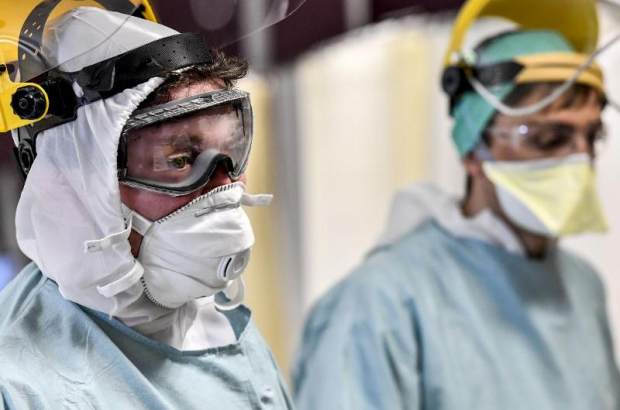- Daily & Weekly newsletters
- Buy & download The Bulletin
- Comment on our articles
Coronavirus in Belgium: Behind the masks of some of the country’s frontline workers – Part 3
In the third of a series reporting on Belgium’s frontline workers, the Bulletin talks to some of the people braving the Covid-19 pandemic. From a nurse and care home worker to train and delivery drivers, these key workers are struggling to contain the virus with often limited resources.
The intensive care nurse
Having left the intensive care unit of a hospital in Namur a year ago to pursue her master studies, Aurelie (a pseudonym) didn’t hesitate to return when it appealed for staff at the start of the pandemic.
For more than a month she has been caring for Covid-19 patients, despite the sacrifice to her private life. “It means living away from home and being separated from my boyfriend. It’s my choice because he is at risk.”
There was initially a tense atmosphere in intensive care. “Many of my colleagues were struck down by Covid-19, although not due to work. One of our resuscitators was treated in intensive care and the team’s morale suffered. Fortunately, the situation has now stabilised.”
The intensive care unit was quickly divided into two separate sections with extra beds to respond to the demand. Aurélie mainly works in the Covid-19 zone, while older colleagues remain in the non-infected one. Nurses from other departments in the hospital reinforce the team. “We train them in intensive care. Usually, one nurse looks after three patients, now we have two patients per nurse In the Covid-19 zone, but the care involved is more demanding.”
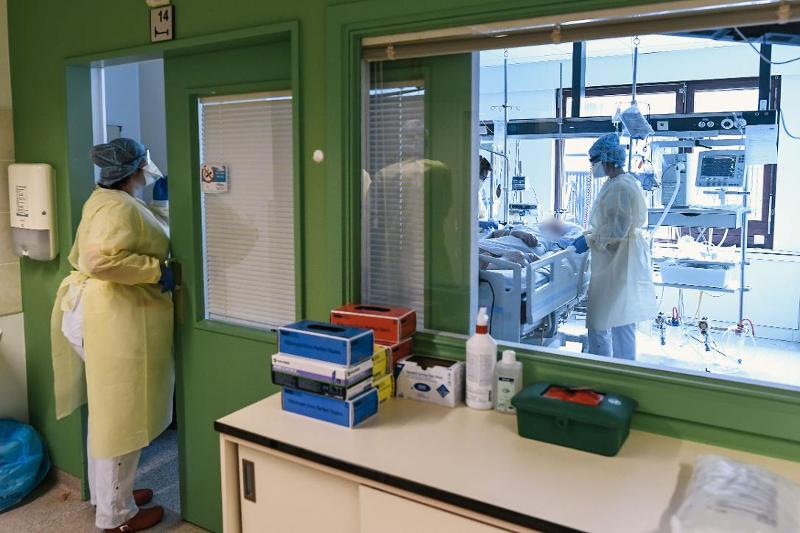
Since the outbreak, staff wear personal protection equipment for long hours, rendering their work much more arduous. They are assisted by colleagues outside the treatment rooms who bring necessary equipment and carry out blood tests.
While protective equipment is currently in sufficient supply, PPE is dependent on available stocks. “We had disposable gowns from the forensic police and now we have washable aprons; we are obliged to economise as much as possible our surgical masks and FFP2.”
A major challenge is a shortage of drugs, including the relaxants required to safely ventilate patients and the drugs used to put patients in a deep artificial coma. “We have resorted to "old recipes", other combinations of drugs that we are not used to.”
Other departments in the hospital are also under pressure with many deaths occurring among infected patients. One of the more difficult aspects for Aurélie is that intensive care places are not available for all seriously ill patients. “There are a number of criteria. If patients go downhill in another department, we do not accept them in resuscitation. As a nurse, that’s extremely difficult to accept.”
Although she is not overly worried about becoming infected, “I’m not high risk and we have enough PPE”, she wears home-made masks when out shopping to limit the risk of contaminating others.
“I can only encourage people to respect the rules. Even if you don’t fear for your own health, don’t forget that you could still contaminate others. A lot of people are making sacrifices to fight this pandemic and support has been put in place so that the confinement is as bearable as possible. Don’t hesitate to draw on this,” she says.
The care home worker
A young father, who does not wish to be named, earns his living making food in a care home in the province of Flemish Brabant. When the coronavirus was diagnosed there, an outbreak plan was launched. Since then, he has watched in horror as people in boiler suits with visors come in vans to take away the deceased in body bags.
Meanwhile he and his wife, a primary school teacher, face a nail-biting wait to find out whether he has contracted the virus, increasing the risk for her and their young children.
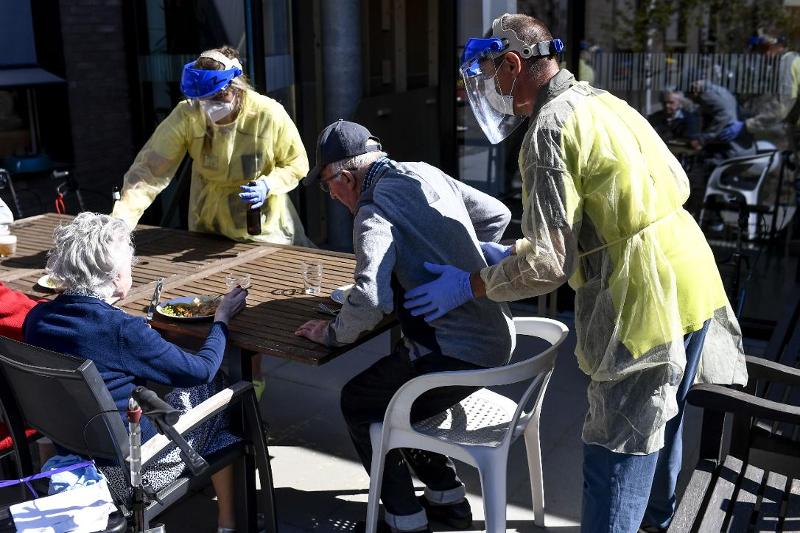
Prior to the lockdown, all kitchen staff in the care home had to take their temperature three times a day and wash hands regularly. Now they must wear gloves, a face mask and send meal trays by elevator rather than delivering them personally.
With the discovery of the virus, those residents who were able to make their own food can no longer do so. “This is the big difference for me. I had to prepare about 150 meals before; now I must prepare 300.”
But the practical changes are just a small part of the picture. While he is stoical, “it’s my job and I do my job”, his wife adds: “He is stressed. He comes home and takes his computer and looks at the news about corona. I think he is very busy with it in his mind but he doesn’t want to say.”
They had planned to visit family in Morocco this summer. “We were talking in the car the other day [she drives him to work so he can avoid the bus] and we said let us stay home one summer and then we can enjoy 30 summers more. What is one summer in a lifetime?”
The train driver
While SNCB has seen passengers numbers drop by up to 90% during the corona crisis, train personnel are still essential workers. “I have been working since the shutdown,” says Johan (a pseudonym), who chauffeurs a train for SNCB. “There was no choice; it was clearly communicated that we were to keep going, to bring people to work who have essential jobs.”
While train drivers sit in a cabin and don’t work directly with the public, Johan finds they are in an even more precarious situation than their colleagues who work in passenger carriages. “The conductors have been relieved of their ticket-taking duties, so they don’t have to handle tickets or money and can avoid direct contact with the public. They just have to stay available in case of emergencies, and they continue to make announcements.”
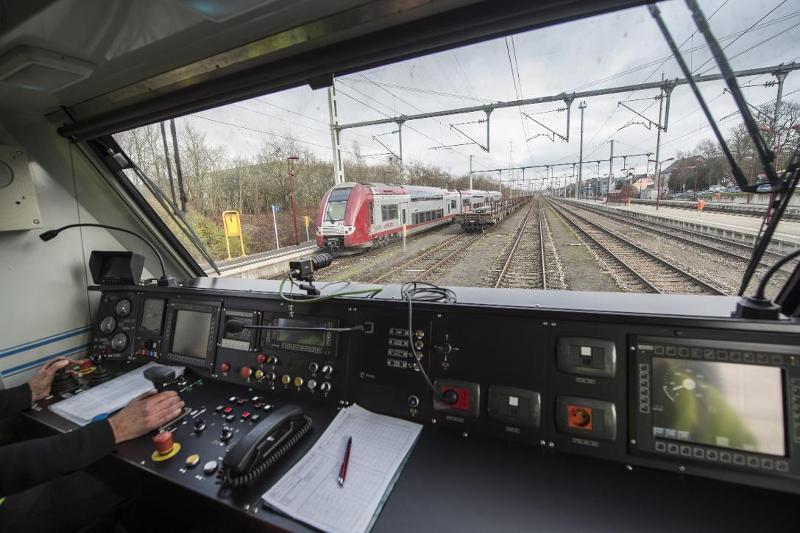
The public have responded very well to the measures taken to control the spread of the virus. “Trains are fairly empty, so that’s a relief,” he says. “And most people indeed do keep to social distancing.”
Still, it’s almost impossible to avoid contact with passengers, even for the drivers. “A train is a very confined space, and when people get on and off, and I have to switch steering cabins, I’m bound to come within that much-needed 1.5 metres.”
But the most challenging aspect is hygiene inside the driver’s compartment. “We all received disinfectant gel, but they promised to clean the cabs daily, which has remained a promise,” says Johan. “A couple of weeks into the crisis, they provided cleaning supplies for drivers who wanted to take matters into their own hands.”
Which Johan has – and with his own product. “I carry a homemade 90% ethanol mix in a liquid sprayer in my bag so I can sanitise the cabin when I relieve colleagues or when I prepare the train in the morning. I also use disinfectant wipes to wipe everything down that anyone needs to touch in the cabin.”
And train drivers often have to rely on another essential worker: a taxi driver. “For early shifts, we often start with a taxi ride to the train we have to prepare, which again brings you in close contact with someone. The cab driver and passenger are less than an arm’s length apart.”
The furniture delivery driver
While furniture shops are closed, many of them are selling online, which has become more popular during the coronavirus crisis. So you would think that Jonas, who delivers furniture for the Weba chain, would have plenty of work. But it’s more complicated than that.
“We used to bring the furniture inside for the customers, and we assembled it all if needed,” he says. “But because of the coronavirus, now we just have to leave it all at their door.”
Also, there’s no traffic. So delivery in general has never been easier for the drivers, but it all happens in much less time. “Weba tried to keep my partner and me working eight hours a day, but it just proved impossible. So now we are having to use all of the overtime we worked so hard to build up over the last few months.”
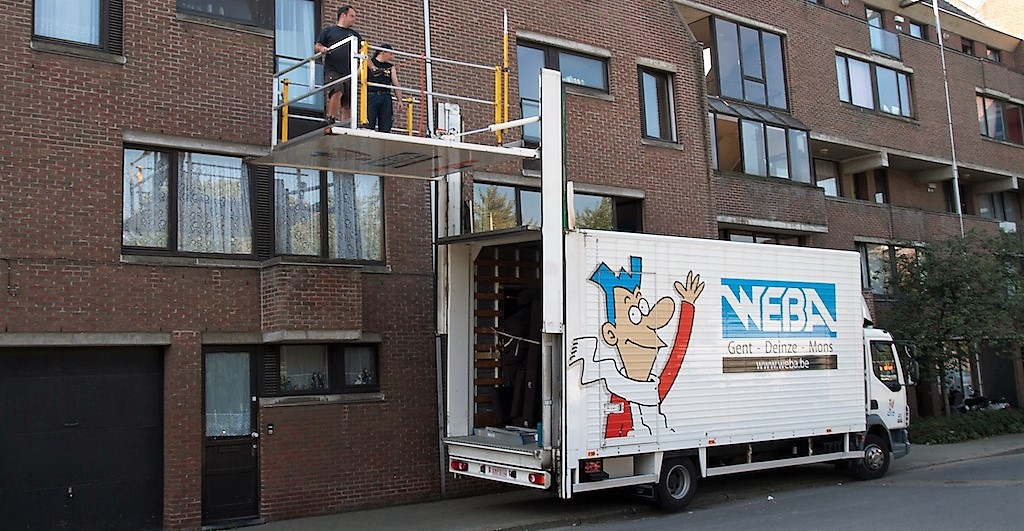
Jonas was planning to use those overtime hours as paid holiday. But they are simply filling in the hours he isn’t able to work now, so that he can be paid full time.
The job, though, has never gone so smoothly. “Despite corona, working as a driver is a great job right now. There’s no traffic, and we’re always on time. And the safety measures we have to follow are not difficult.”
The only real problem has been getting the customers on board with the rules. Jonas is not allowed to enter their homes to deliver the furniture, nor to put it together for them. “There are always customers who don’t understand this and always try to convince us to do it. In fact, they don’t respect the measures and come in constant contact with us. We can’t always get the heavier piece of furniture to their doors safely.”
Photos: Nurses in protective gear at Sint-Trudo hospital, Sint-Truiden©Belga/Dirk Waem; Imelda Hospital in Bonheiden©Belga/Dirk Waem; Rest home in Deerlijk©Belga/©Belga/Anthony Dehez; Courtesy Weba
Behind-masks-some-countrys-frontline-workers - Part 2
Behind-masks-some-countrys-frontline-workers - Part 1












